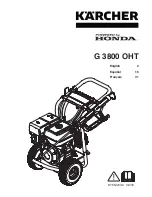
13
INSTALLATION INSTRUCTIONS
NOTE
• For your safety, and for extended product life, use only
authorized components. The manufacturer is not re-
sponsible for product malfunction or accidents caused
by the use of separately purchased unauthorized parts.
• Use new hoses when you install the washing machine.
Do not reuse old hoses. Use only the inlet hoses
provided with the washer. LG does not recommend the
use of aftermarket hoses.
• Periodically check the hoses for cracks, leaks and wear,
and replace the hoses every 5 years.
• Do not stretch the water hoses intentionally, and make
sure that they are not crushed by other objects.
• Water supply pressure must be between 14.5 PSI and
116 PSI (100~800 kPa). If the water supply pressure is
more than 116 PSI, a pressure reducing valve must be
installed.
• To provide optimum washing performance the hot wa
-
ter temperature should be set at 120-135°F (48-57°C)
and the cold at 60°F (15°C).
Connecting the water lines
1
Check the rubber seals on both sides of the hose.
- Insert a rubber seal into the threaded fittings on each
hose to prevent leaking.
2
Connect the water supply hoses to the HOT and COLD
water faucets tightly by hand and then tighten another
2/3 turn with pliers.
- Connect the blue hose to a cold water faucet and the
red hose to a hot water faucet.
4
Connect the hoses to the water inlets tightly by hand and
then tighten another 2/3 turn with pliers.
- Connect the blue hose to the cold water inlet and the
red hose to the hot water inlet.
5
Check for leaks by turning on the faucets.
- If water leaks, check steps 1 to 4 again.
3
After connecting inlet hose to water faucets, turn on the
water faucets to flush out foreign substances (dirt, sand
or sawdust) in the water lines. Let water drain into a
bucket, and check the water temperature.
Cold
water
inlet
Hot water
inlet
Rubber seal
Water hose
(To water inlet on the
washing machine)
Rubber seal
Water hose
(To faucet)
WARNING
•
Do not overtighten.
Damage to the coupling can result.
WARNING
•
Do not overtighten the hoses.
Overtightening can damage the valves resulting in
leaking and property damage.
Summary of Contents for F1069FD2S
Page 44: ......














































